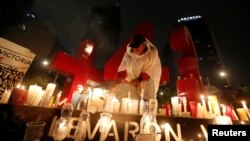Independent investigators who probed the disappearance and apparent massacre of 43 Mexican students in 2014 called Wednesday for a robust follow-up to resolve the high-profile case and establish the truth.
Claudia Paz y Paz and Carlos Martin Beristain served on a five-member panel that accused the government of President Enrique Pena Nieto in April of undermining its inquiry.
The panelists were in Geneva to meet U.N. High Commissioner for Human Rights Zeid Ra'ad Al Hussein, who has voiced dismay at a lack of progress in resolving the "emblematic" case of 43 trainee teachers from Ayotzinapa who disappeared in the southwestern city of Iguala.
"We made many recommendations to deepen the investigation, mainly related to drug trafficking of heroin as a possible motive. The prosecution has not fully addressed this hypothesis," Paz y Paz, a former attorney general of Guatemala, told Reuters.
Mexico's military has been accused on multiple occasions of extrajudicial killings and torture during a decade-long war against the brutal drug cartels.
"It is up to the state's willingess to investigate what actually happened," Paz y Paz said. "We expect a strong follow-up mechanism."
The government says that corrupt police handed the 43 students over to drug gang henchmen in late 2014, who then incinerated them at a garbage dump in the southwestern state of Guerrero.
Disputed by experts
The experts report said that the government's fire theory is scientifically impossible. The remains of just one student have been identified, from a charred bone fragment.
"We also asked the government and judiciary to investigate the actions and conduct of the head of the criminal investigation unit, Tomas Zeron, because he was present at the crime scene a day before. It has been documented," Paz y Paz said, referring to the river where the bone fragment was found.
The attorney general's office said in April that Zeron was under investigation. The expert panel presented video and photographs suggesting that he was at the site where the bone was found a day before its official discovery, but made no report of his visit.
Mexico's U.N. ambassador, Jorge Lomonaco, said Tuesday that a "preliminary agreement" on a follow-up probe was being finalized with the Inter-American Commission of Human Rights, which sent the first panel.
"We are committed to the victims, to clarifying the truth and punishing those who are guilty, so that this never happens again," Lomonaco told an NGO-sponsored event.
Beristain said that the terms of the follow-up probe were not set, but should include at least three visits over six months by a team with full access to all files.
"If solved, it will be a positive sign that impunity can be overcome in many other cases," he said.





